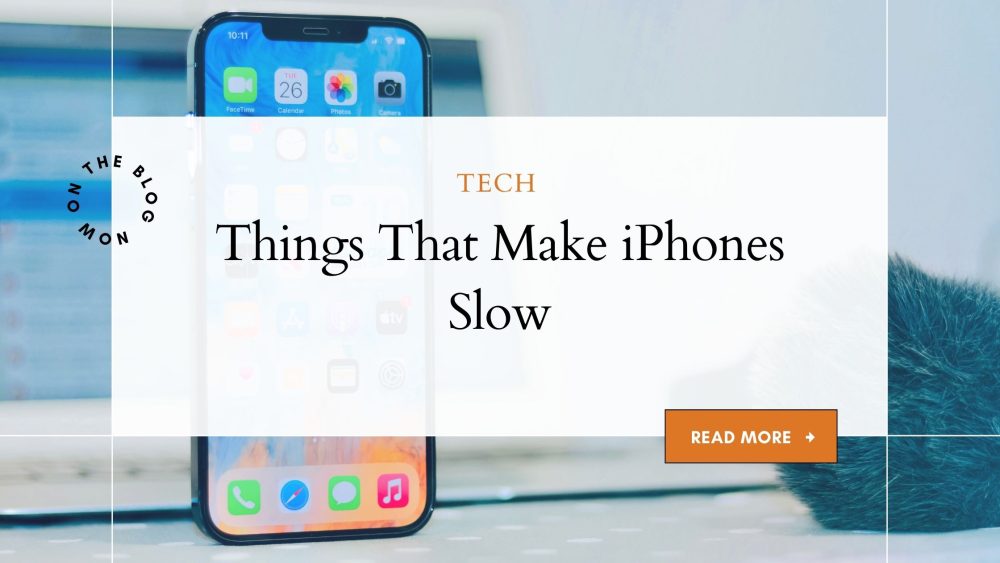11 Things That Reduce Your iPhone’s Performance and Make It Slower

Are you concerned about your iPhone’s sudden slow performance? Not every mobile device maintains its smooth performance for several years; some may experience issues such as slowness, rapid battery drain, and app lag. You may think the reason is that the iPhone is getting older. But we also made some mistakes while using it. We have to update the software regularly and delete unused apps. Here are 11 things that reduce your iPhone’s performance.
11 Things That Reduce Your iPhone’s Performance and Make It Slower
1) Too Many Background Apps Running
Having multiple apps running in the background consumes RAM and slows down performance. Even though iOS is optimized to handle background apps efficiently, force-quitting unused apps can sometimes free up resources.
Double-tap the home button (or swipe up on Face ID models) and close unnecessary apps.
2) Low Storage Space
If your iPhone is running low on storage, it may struggle to function properly. When storage is nearly full, your device slows down because iOS needs free space to operate efficiently.
Delete unused apps, offload large files, and use iCloud or Google Photos to store pictures.
3) Outdated iOS Version
Running an outdated iOS version can cause lag, security issues, and incompatibility with newer apps. Apple often updates its software to make it work better and fix problems.
Go to Settings → General → Software Update and install the latest iOS update.
4) Too Many Widgets on the Home Screen
Widgets provide useful information, but having too many active widgets running in the background consumes battery and system resources.
Remove unnecessary widgets by long-pressing on them and selecting Remove Widget.
5) Recycle Bin Not Deleted
Deleted files in the recycle bin still occupy storage space, leading to reduced performance. Regularly empty your recycle bin to free up storage and maintain smooth functionality.
6) Excessive Background App Refresh
Background App Refresh allows apps to update content in the background, but having it enabled for all apps can slow down your iPhone.
Disable it for apps that don’t require real-time updates by going to Settings → General → Background App Refresh.
7) Too Many Safari Tabs Open
If you have dozens of tabs open in Safari, it can take up RAM and slow down your browsing experience.
Close unnecessary tabs by opening Safari, pressing the tab button, and swiping away unused tabs.
8) Using Heavy Custom Wallpapers & Live Wallpapers
Live wallpapers and high-resolution images consume more battery and processing power than static, optimized wallpapers.
Use a simple or static wallpaper by going to Settings → Wallpaper and selecting a non-animated option.
9) Too Many Notifications Enabled
Frequent notifications from various apps not only distract you but also slow down your iPhone over time.
Go to Settings → Notifications and disable alerts for apps that don’t require constant attention.
10) Battery Health Degradation
As your iPhone’s battery health depletes, it affects overall performance. iOS may slow down processing speeds to prevent unexpected shutdowns.
Check battery health under Settings → Battery → Battery Health & Charging. If it’s below 80%, consider replacing the battery.
11) Accumulated Cache and Junk Files
Apps and browsers store cache files, which can slow down your iPhone over time. Clear app cache and Safari history periodically.
Uninstall unnecessary apps and use Lite versions of apps (such as Facebook Lite) when available.
Maintaining the iPhone’s apps, closing unwanted taps, deleting unused apps, and regular software updates can make your iPhone life longer. If you want a smooth iPhone experience, avoid these 11 mistakes that can reduce your iPhone’s performance. Use mobile with care and make it a smoother experience.
Did you find these tips helpful?
Frequently Asked Questions (FAQs)
1) How do I clear cache and junk files on my iPhone?
To clear the Safari cache, go to Settings → Safari → Clear History and Website Data. For apps, you can uninstall and reinstall them to get rid of extra cache files.
2) How often should I update my iPhone software?
You should update your iPhone whenever Apple releases a new update. These updates make your phone run better, fix any problems, and keep it safe.






 Mobile Covers
Mobile Covers



